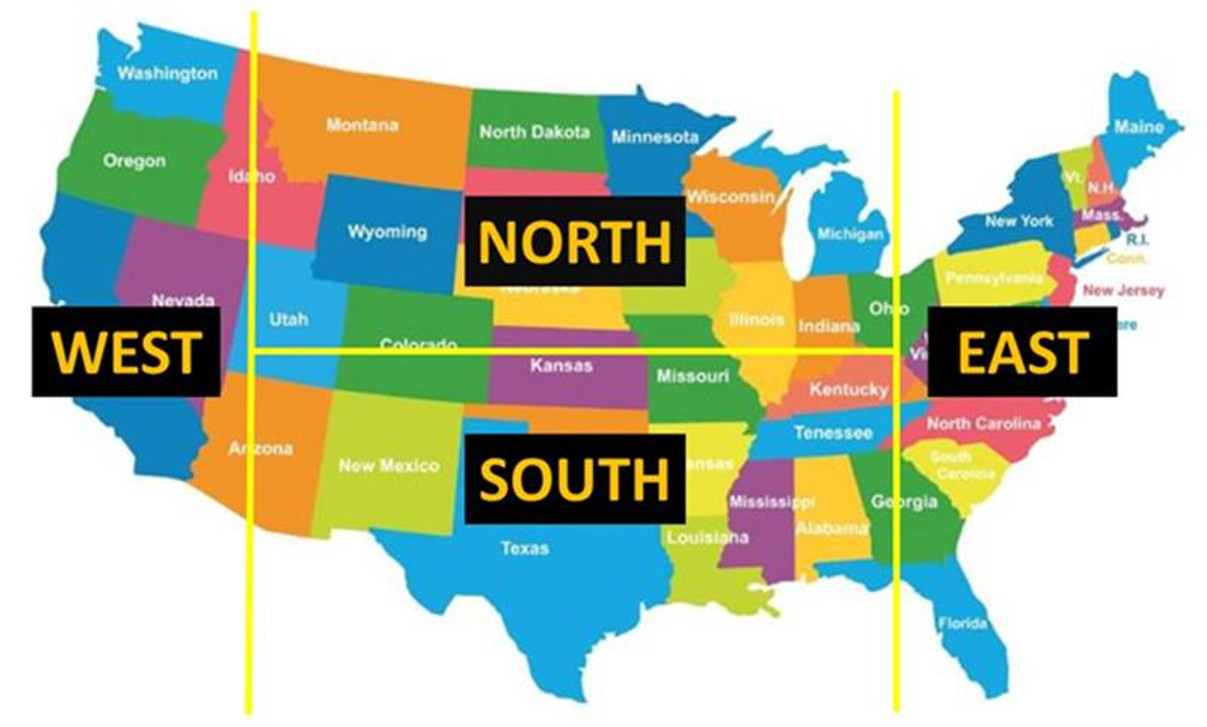Depending on what part of the country you live in, the answer will be different. To answer the question, we roughly divided the United States into four different regions.
Each region has a different reason for sealing and protecting the concrete in your home.
But all regions have some things in common “we seal because”:
- Keep our home looking beautiful
- To protect my biggest financial asset
- To avoid expensive home maintenance replacement costs
Let’s start with the unique reasons for sealing in each region:
North Region: In the north region the concrete is sealed to protect from the long cold winters with lots of snow and ice. Extensive cold and snow over concrete will cause the concrete to crack due to the humidity inside the concrete freezing and expanding. Also using deicers and snow melters can eventually allow unfrozen water to reach the rebar inside of the concrete and create rust and fracturing. It is important to use a snow and ice melter with a very low refreezing temperature to prevent this freeze-thaw damage. Another factor is ground heaving. When the humid ground below the concrete gets too cold and freezes, it will heave and potentially break the concrete. The sealer will prevent many of these problems because it reduces the amount of water the concrete absorbs and helps keep the ground below the slab dry.
South Region: In the South we seal concrete to protect from the extreme heat exposure. When concrete gets very hot it expands and the humidity in the ground below the concrete starts evaporating through the concrete. This evaporation through the concrete draws the salts from the ground and from the concrete to the surface. They show up as efflorescence which is white or the color of the local ground from brownish to yellowish color and can create permanent staining of the concrete. Another factor in the southern region is the numerous freeze/thaw cycles during winter which stress the concrete by expansion and contraction creating spalling and cracks. Sealing the concrete closes the pores in the concrete and reduces the negative impacts of these effects.
East Region: This region of the United States has a combination of problems from extreme cold to extreme heat and the extreme humidity. The southern part of this region has extensive rain all year. This rain penetrates the concrete and rusts the rebar which makes the concrete crack. Mold and mildew on the concrete is very typical because the concrete never has a chance to dry completely. Mold and mildew are plants that grow in the concrete and over time break it apart. It can also stain the concrete permanently. Also, near the coastal areas the sealer prevents penetration of the ocean salts. The sealer prevents excess water from entering the concrete, reduces the amount of humidity on the ground, helps prevent rebar rusting and reduces mold and mildew growth.
West Region: This region of the United States includes all the problems of the East Region - extreme cold to extreme heat and the extreme humidity. The northern part of this region has excessive rain and this rain penetrates the concrete and rusts the rebar which makes the concrete crack. Mold and mildew on the concrete is very typical because the concrete never has a chance to dry completely. Mold and mildew, left untreated, can eventually permanently stain the concrete. Also, near the coastal areas the sealer prevents penetration of the ocean salts exposure. In the southern area smog and other dirt factors impregnate the concrete and makes it look dirty. The chemicals in the smog can also break down the concrete over time. The sealer prevents excess water from entering the concrete, reduces the amount of humidity under the slab, helps reduce rebar rusting, makes the concrete easier to clean, reduces mold and mildew growth and reduces the dirt and staining factor.
To know what sealer, you should use for your concrete, natural stones, decorative concrete or pavers click More sealer information. To know how to clean concrete click More cleaner information.

